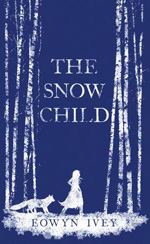

Headline Review, harcover, 9780755380527
Reagan Arthur Books, hardcover, 9780316175678 (February)
Eowyn Ivey's debut novel is stunning. She has created a small world within the wilds of her native Alaska and peopled it with characters that feel as real as the neighbors next door. Full of the everyday drama of the human experience, the story of Mabel and Jack is familiar, yet there is an element of magic that creates a sense of the unknown. Using the Russian folktale Snegurochka, or The Snow Maiden as a foil, Ivey creates a transforming story of the power of faith in love, even in the face of others' disbelief and one's own doubts.
Life is grey and bleak for Mabel. She and her husband, Jack, live in a lonely cabin in the wilderness of 1920's Alaska. Haunted by the grief of a miscarriage and the inability to have children, Mabel had thought that making a new start on a remote homestead would allow her peace and return companionship and joy to her marriage. But it isn't working.
Jack is desperately working their struggling farm, trying to scratch a living out of the stubborn forest soil. He blames himself for every setback and for his perception of continually disappointing Mabel. Feeling the aches of age worsen with every passing day, he continues striving to provide for, protect, and love his wife. But what if his efforts aren't enough? What if he fails?
Their second winter in Alaska arrives with a beautiful first snow, and Jack and Mabel frolic in the yard with unfamiliar abandon. Caught up in the moment, they decide to build a snowman, but slowly make changes until it resembles a snow girl, a representation of their hearts' innermost longings. When Jack goes for firewood later that night, he discovers that the snow girl is destroyed and the scarf and mittens adorning it are gone. A mysterious girl begins appearing around the cabin wearing the missing items, and Jack methodically tries to discover her identity, while Mabel struggles with her desire to control love and to defend her belief in the impossible.
Then there is Faina, the fierce and wild, yet innocent, girl who turns their small world upside down. Beautiful, graceful, and independent, she inspires both love and an inkling of fear. Her only companion is a red fox, a symbol of her link with her unfettered life in the woods. Repeatedly she must confront the question of her identity and the choice between life in the woods or among the people who love her.
Elegantly written, the author creates evocative descriptions of the wildness and beauty of an Alaska she knows well. She writes vividly of the rugged terrain, the wild weather, and the furtive, fierce creatures that inhabit the wilds. The beauty of a single snowflake is not too small to be described and celebrated. Nor is the fact of hunting, both by animals and humans, avoided or dramatized.
Equally deftly, Ivey develops a small cast of characters with whom you become emotionally engaged, by turns laughing and grieving alongside them. Their lives border on the stereotypical: loud Esther with her men's pants and practical mindset; Garrett, the budding wilderness man; the Russian trapper who comes to town only for supplies and whiskey. But the characters avoid being cardboard cut-outs by their ability to grow and by the small, human details that are revealed as the story progresses. Ivey magically brings her characters to life, warts and all.
A haunting plot, exquisite landscapes, and compelling characters prevent the story from feeling like a grown-up fairy
tale. Fresh and unusual, the book evokes a range of emotion and offers a new perspective on growing older and on
the choices we make that effect how our lives' stories will end. Don't hesitate over this one: The Snow Child deserves
to be read, savored, and enjoyed again.
